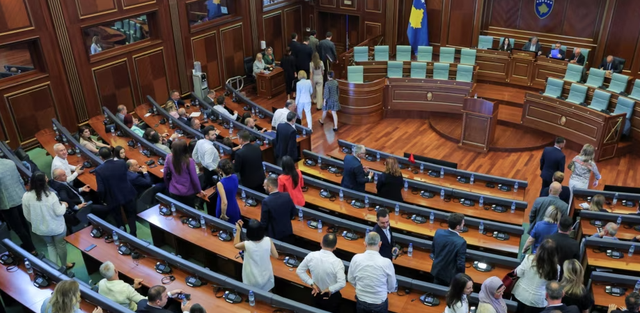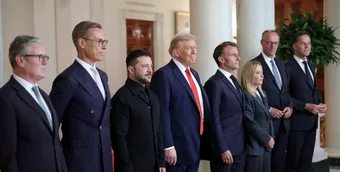
Political impasse in Kosovo, REL: Politics stagnates, opportunities disappear


For the first lady of Kosovo, Vjosa Osmani, the institutional void in the country is not simply a procedural crisis, but a serious obstacle to strategic projects - from reforms for European integration, to defense and economic agreements with international allies.
For the United States, too, the blockade results in "missed opportunities for Kosovo."
The Kosovo Assembly failed to be constituted even on August 20, despite the Constitutional Court's ruling, which ordered its formation within 30 days.
This deadline will expire on September 18th and from what the acting Prime Minister, Albin Kurti, has stated, the expectations are that it will be respected.
However, none of the candidates for speaker of parliament, proposed by his party, the Vetëvendosje Movement, received enough votes in the August 20 session.
The constitutive session, which began on April 15th, but without an epilogue due to disagreements between parties, will continue again on August 22nd.
Osmani said that the constitution of the Assembly is a "state emergency."
Her media advisor, Bekim Kupina, tells Radio Free Europe that the institutional vacuum endangers "projects related to the reform agenda for development and European integration, as well as those aimed at improving energy infrastructure and economic development."
According to him, the constitution of the Assembly and a functional Government are also necessary for the realization of agreements - including strategic ones in the field of defense and economy, which, as he says, Osmani has discussed with the administration of US President Donald Trump.
"These agreements and commitments are unique opportunities for strengthening the country's security and economic growth, which require consolidated institutions to implement ," says Kupina.
Last month in the US, Osmani met with US Deputy Secretary of State Christopher Landau and other senior officials, with whom he said he discussed the importance of creating a new economic partnership in the energy, defense, and information technology sectors.
Responding to Radio Free Europe's question about how he sees the delay in the formation of institutions in Kosovo, even half a year after the parliamentary elections, a spokesperson for the US Embassy in Pristina said that " the Constitutional Court of Kosovo has issued its decision " and " the political leadership must work together to form institutions in accordance with the Constitution and the decisions of the Constitutional Court."
" The people of Kosovo expect their leaders to fulfill their commitment to work in the best interest of the country ," the spokesperson said.
“Kjo bllokadë e vazhdueshme politike po rezulton në mundësi të humbura për Kosovën. Është koha që udhëheqja të bëjë prioritete progresin dhe stabilitetin në dobi të të gjithë qytetarëve”, shtoi ai.
REL-i iu drejtua me të njëjtën pyetje edhe Zyrës së Bashkimit Evropian në Kosovë, e cila tha se “formimi i shpejtë i Kuvendit dhe i Qeverisë është thelbësor për Kosovën që të ecë përpara me reformat e rëndësishme në të gjithë sektorët, të cilat do të përmirësojnë cilësinë e jetesës dhe standardin e jetesës së qytetarëve të Kosovës”.
Nga ambasadat e vendeve të QUINT-it u përgjigj edhe ajo e Italisë, e cila shfaqi shpresën që “të gjithë aktorët politikë të punojnë me përgjegjësi për të siguruar konstituimin e Kuvendit me kohë”.
Lulzim Peci, nga Instituti Kosovar për Kërkim dhe Zhvillim të Politikave (KIPRED) në Prishtinë, paralajmëron se nëse Kuvendi nuk konstituohet brenda afatit 30-ditor të përcaktuar nga Gjykata Kushtetuese, Kosova do të futet “në një terren të panjohur, që nuk i shihet fundi”.
“Ky terren e ka emrin ‘anarki institucionale’. Mos të harrojmë që brenda një kohe, ne mund të mos kemi numër të mjaftueshëm të gjyqtarëve në Gjykatën Kushtetuese dhe pastaj mbetemi në anarki totale”, thotë Peci për Radion Evropa e Lirë.
Me Kushtetutë, Gjykata Kushtetuese duhet t’i ketë nëntë anëtarë, por aktualisht ka vetëm shtatë.
Në shtator, i përfundon mandati gjyqtarit Bajram Latifi dhe nëse deri atëherë nuk emërohet një gjyqtar i ri – gjë që kërkon miratimin e Kuvendit – Gjykata mbetet pa kuorum për vendimmarrje.
Peci paralajmëron se një situatë e tillë do të sillte pasoja të rënda për shtetin.
“Mund të na çojë në një shtet të kolapsuar. Pasojat nga kjo do të ishin të jashtëzakonshme, si për procesin demokratik, për marrëdhëniet me partnerët tonë (ndërkombëtarë), për ekonominë… Anarkia institucionale është skenari më i zi që mund ta presë Kosovën”, thotë Peci.
Sipas vlerësimit të tij, Kosova sot pasqyron imazhin e një vendi joserioz, ku interesat e ngushta të politikanëve mbizotërojnë interesin shtetëror.
Një qasje e tillë, siç thekson Peci, përbën pengesë serioze për ndërtimin e partneriteteve me vendet perëndimore, të cilat kërkojnë partnerë të përgjegjshëm dhe të aftë për të marrë vendime.
Ai shton se situata aktuale është bërë një rrethanë e rehatshme për partitë politike, të cilat, siç thotë, e shmangin marrjen e përgjegjësive qeverisëse dhe të vendimeve të mëdha që e presin vendin.
Në mesin e këtyre vendimeve, ai përmend zbatimin e Marrëveshjes së Ohrit për normalizimin e marrëdhënieve me Serbinë (2023) dhe Marrëveshjes së Uashingtonit për normalizim ekonomik me Serbinë (2020).
Augustin Palokaj, gazetar që prej vitesh ndjek nga afër politikat e Bashkimit Evropian, vlerëson se si BE-ja, ashtu edhe bashkësia ndërkombëtare në tërësi, po e trajtojnë krizën institucionale në Kosovë përmes dy qasjeve.
The first is a passive approach: the EU is standing by, leaving Kosovar politicians to deal with the political impasse they have created through narrow calculations and an unwillingness to compromise.
The second approach is more warning-based: through continuous statements, the EU recalls the direct and long-term consequences that the lack of institutional stability brings.
According to Palokaj, the consequences are primarily related to European funds.
The European Commission cannot transfer the first payment of over 80 million euros from the Growth Plan for the Western Balkans to Kosovo.
This amount is foreseen as pre-financing, but to proceed, a functional government is required to propose the agreement for loans and funds, as well as an assembly to ratify it. Without these institutions, the money remains blocked.
Another consequence, according to Palokjat, is related to the process of membership in the Council of Europe.
Without a constituted assembly and a new government, Kosovo cannot fulfill the set conditions, so the issue cannot even be placed on the agenda.
" In these circumstances, when we cannot enter the Council of Europe, when we cannot receive payments from the European Commission, when punitive measures are still in force against Kosovo [due to tensions in the north], we cannot expect Kosovo to advance in the process of obtaining candidate status for membership in the European Union ," Palokaj tells Radio Free Europe.
Of the six Western Balkan countries, Kosovo is the only one that does not have this status.
Palokaj does not expect the EU to intervene directly in resolving the institutional crisis in Kosovo, so the responsibility seems to remain entirely with the country's political class itself.
Kupina did not respond to REL's question about whether the president, as a factor of unity, is considering any form of intervention./REL

The Ukraine summit that ignored the tough questions
ideas
top
Alfa recipes
TRENDING 
services
- POLICE129
- STREET POLICE126
- AMBULANCE112
- FIREFIGHTER128



























